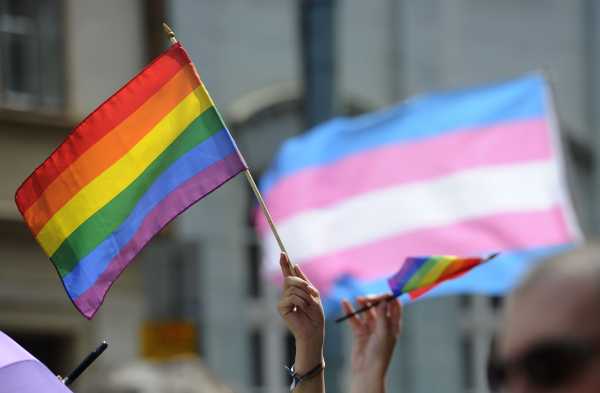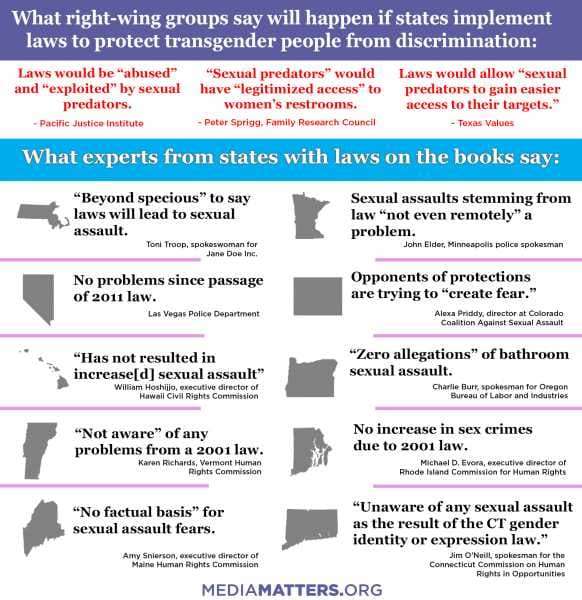
The New Hampshire legislature this week passed a bill to protect transgender people from discrimination in certain settings — and Gov. Chris Sununu, a Republican, has said that he will sign the bill into law.
The bill is “the first proactive victory on LGBTQ rights in any state since 2016,” according to advocacy group Freedom New Hampshire, which backed the legislation. The bill would make New Hampshire the 20th state with civil rights protections that cover trans people. It was the last state in New England without such protections in place.
The bill bans discrimination based on gender identity in employment, housing, and public accommodations (such as restaurants, hotels, and other places that serve the public). Such protections are already in place against discrimination based on race, sex, religion, and sexual orientation — so the law effectively extends those same protections to trans people.
“In a national landscape where transgender people are too often attacked for who they are, New Hampshire is a shining example for other states across the country,” Linds Jakows, campaign manager for Freedom New Hampshire, said in a statement. “We look forward to the day Gov. Sununu seals New Hampshire’s motto of Live Free or Die with his signature.”
The victory is notable because it got bipartisan support — enough to get through a Republican-controlled House and a Republican-controlled Senate (although with mostly Democratic votes), and expected to soon get a Republican governor’s signature.
It’s also notable because most states do not have laws protecting LGBTQ people from discrimination.
Most states don’t explicitly ban anti-LGBTQ discrimination
The bill would help fill part of a gap in LGBTQ rights across America: Under federal and most states’ laws, LGBTQ people aren’t explicitly protected from discrimination in the workplace, housing, or public accommodations. So someone can be fired from a job, evicted from a home, or kicked out of a business just because an employer, landlord, or business owner doesn’t approve of the person’s sexual orientation or gender identity.
But some federal and state laws do ban discrimination based on race, religion, nationality, and sex in the workplace, housing, and other settings. This is what the Civil Rights Act and other federal and state civil rights laws that followed were about.
Now, some LGBTQ activists argue that federal law prohibiting sex-based discrimination already protects LGBTQ people in some of these settings.
The claim: Discrimination against people based on their sexual orientation or gender identity is fundamentally rooted in prohibited sex-based expectations. For example, if someone discriminates against a gay man, that’s largely based on the expectation that a man should only love or have sex with a woman — a belief built on the idea of what a person of a certain sex should be like.
Similarly, if someone discriminates against a trans woman, that’s largely based on the expectation that a person designated male at birth should identify as a man — again, a belief built on the idea of what a person of a certain sex assigned at birth should be like.
So laws that ban discrimination based on sex should cover LGBTQ people too, according to this argument.
But the courts, particularly the Supreme Court, have yet to uphold this interpretation. So for now, states have passed their own explicit nondiscrimination protections shielding LGBTQ people.
The typical argument against trans protections is a myth
Opponents of nondiscrimination protections for trans people frequently point to a certain facility to make their case: bathrooms.
Specifically, they claim that letting trans people use the bathroom or locker room for their gender identity, as some nondiscrimination laws do, will allow men to disguise themselves as trans women to go into women’s bathrooms or locker rooms and sexually assault and harass women.
In New Hampshire, critics of the nondiscrimination bill made similar arguments. State Rep. Al Baldasaro (R), for one, wondered if the bill would “open up the doors where a male who is a female is able to take a shower with my granddaughters.”
But even if trans people are allowed to use the bathroom or locker room that aligns with their gender identity, sexual assault remains illegal.
There’s also no evidence that nondiscrimination laws — and other policies that let trans people use the bathroom for their gender identity — lead to sexual assault in bathrooms and locker rooms. In two investigations, left-leaning media watchdog organization Media Matters confirmed with experts and officials in 12 states and 17 school districts with protections for trans people that they had no increases in sex crimes after they enacted their policies.

Opponents of nondiscrimination laws counter that there are some examples of men sneaking into women’s bathrooms to attack women. But as PolitiFact reported, none of the examples cited in the US happened after a city or state passed a nondiscrimination law or otherwise let trans people use the bathroom or locker room for their gender identity. Instead, these seem to be examples of men doing awful things regardless of the law — which has, unfortunately, happened since the beginning of civilization.
One example is a case in Toronto, Canada, which now has a nondiscrimination law, in which a man disguised himself as a woman and attacked women in shelters. But the attacks happened months before Ontario (Toronto’s province) protected trans people in a nondiscrimination law. So the law couldn’t have been the cause.
While the issue is now being used primarily against trans people, historically bathroom fears have been regularly deployed against civil rights causes. It was used against black people to justify segregation — by invoking fears that black men would attack white women in bathrooms. And it was used to stop the Equal Rights Amendment, which tried to establish legal equality between men and women, because opponents claimed it would lead to the abolition of bathrooms for different genders, potentially putting women in danger.
Some people are also, frankly, just bothered by the idea that someone in the same bathroom or locker room won’t share the same genitalia as them.
This gets to the heart of the issue: Bathrooms are places where really private things happen, and that makes people feel vulnerable in all sorts of ways. “People are afraid because they’re exposed,” Kathryn Anthony, author of Designing for Diversity: Gender, Race and Ethnicity in the Architectural Profession, told the Guardian. “There’s a vulnerability we feel in public restrooms we don’t feel in other places.”
But a lot of things happen in public bathrooms that people aren’t comfortable with — and people have managed to deal with it to accommodate others’ rights and needs.
So if it’s not harming anyone, perhaps it’s best, LGBTQ advocates argue, to let trans people use the facility for their gender identity without making them feel ostracized and discriminated against. (Discrimination is a huge contributor to gender dysphoria, a medical condition that some trans people experience that can cause depression, anxiety, and even suicidal ideation.)
In New Hampshire, at least, it seems that LGBTQ activists have made the winning case.
Sourse: vox.com






